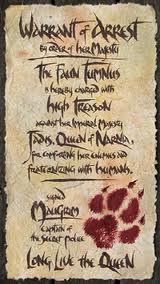- "Be still, stranger, or you'll never move again!"
- ―Maugrim, threatening Edmund. [src]
Maugrim, also known as Fenris Ulf, was a ferocious talking wolf in Narnia, and the captain of the White Witch's Secret Police at the very end of the Long Winter. He was one of the White Witch's most loyal followers, and was known for his cruelty and viciousness to the other Narnians.
Biography[]
Throughout the Chronicles[]
Maugrim was born during the Age of Winter, and at some point joined her Secret Police. Over time he rose to the position of police captain, no doubt because of his contempt for his fellow Narnians and his fierce loyalty to the Witch. Under his leadership, he and his police force were feared throughout all of Narnia.

Tumnus' arrest warrant, signed by Maugrim.
When Jadis learned that one of her spies, the Faun Tumnus, had seen a human and not informed her, she sent Maugrim to apprehend him. He led the raid on Tumnus' Cave where the Faun lived, and captured him, leaving his home in ruin. He also left behind an intimidating message there, so as to make an example of the poor Faun, and to warn those passing by not to make the mistake of betraying his queen.
Maugrim later encountered Edmund Pevensie while guarding the White Witch's Castle courtyard, after Edmund mistook him for one of the stone statues. Maugrim demanding to know who he was, only to release him and take him to the Witch after Edmund explained that she had sent for him.
- "Come in! Come in! Fortunate favourite of the Queen - or else not so fortunate."
- ―Maugrim granting Edmund entry to Jadis' castle [src]
After Edmund had told the Witch where his siblings were, she sent Maugrim and his wolves to go dispose of them, at the Beaver's Dam. The wolves tracked them there, but by the time they had arrived, they were gone, having already left for the Stone Table, where Aslan and his army were.
Eventually, Maugrim was able to track them all to Aslan's Camp, and attempted to attack Susan and Lucy Pevensie. With the sound of Susan's Horn, her eldest sibling, Peter, ran to her and Lucy's rescue, by drawing his sword and meeting Maugrim in battle, while the girls hid in a tree.
Although Peter at first missed Maugrim, he was able to successfully impale him through the heart, while the wolf howled. The wolf captain died a few moments later.
Physical appearance[]
Personality[]
Relationships[]
Trivia[]
- When given the opportunity to make changes to the texts for publishing the book in US territories, Lewis (amongst other revisions in the book) changed his name to Fenris Ulf (and therefore also Peter's title to "Fenris Bane"), after which these changes were reflected in American editions of the books. Even though Lewis may have had a good reason to change the name, the current Narnia publisher, HarperCollins, in 1994, decided to use Lewis' earlier, unrevised texts to publish today (and also re-order the books so they reflect internal chronology, a change which is also disputed), which refer to him as "Maugrim". This decision has led to the character now being most widely known as "Maugrim," even though many consider his canonical name to be Fenris Ulf.
- C.S. Lewis was a known enjoyer of Norse mythology so the names are more than likely taken from there: the wolf Mánagarm and his father Fenrisúlfr. Mánagarm lives on dying people's blood and swallows the moon, leading to lunar eclipse. Though, he also splashes blood around wherever he goes which makes the sun go black, leading to solar eclipse. Fenrisúlfr was foretold to kill the god Oden during Ragnarök but due to the gods' knowledge of prophecies, the gods bound him which resulted in him biting off the right hand of the god Týr.
- Maugrim's name could also be derived from the words "maw" (mouth) and "grim." Alternatively, his name could be derived the Old Irish words maug or "slave", and rím or "rhyme", meaning "slave of rhyme", or, alternately, "slave of a spell".
